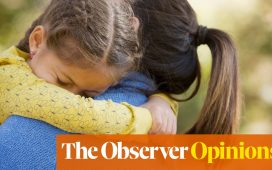
My son, Edmund*, was a healthy baby of five weeks and five days old the day he became ill.
It was early December, 1993. I had taken him upstairs to join his sister in the bath, and while I was undressing him, he went into a state of collapse.
He was grey and unresponsive in my arms. Had it not been for the rasping breaths coming from his limp, lifeless, body, I would have thought he was dead.
I took Edmund to hospital, but nobody could have prepared me for the events that unfolded. He was a very ill baby but the doctors didn’t, at that point, know why – although they said his life wasn’t in danger.
I was breastfeeding and stayed with him day and night. He didn’t improve but his condition was stable.
So many tests were done: X-rays, an ultrasound scan, an MRI scan. Whatever the doctors’ suspicions of the cause was, nobody told me anything.
Mike*, Edmund’s father, would join me at the hospital in the evening so that we could spend time together with our baby, but I was on my own in the daytime to answer the relentless questions that everyone seemed to be asking.
‘Had the baby been ill?’ No.
‘Had he been in an accident?’ No.
‘Had I noticed anything wrong with him?’ No.
‘Had he been left with anyone else?’ Only his father.
We had been in hospital for four days when I was told that Edmund had twin subdural haematomas: bleeding under his skull on both sides of the brain.
When the consultant told me Edmund’s injury was non-accidental, I didn’t even know what he meant. To me, there hadn’t been an accident so therefore he must be ill; surely he would get better and be able to come home?
This was when the police and Social Services became involved. They were waiting to interview me in a room across the corridor on the ward. All of those questions, all over again.
I was desperately afraid and confused. They told me Edmund had been shaken. Who would do this to a baby? I had no idea.
Had I done it? No, there was no way I could, and that was something I never doubted – yet I was guilty until innocence could be proven.
Edmund didn’t come home – at least not from the hospital. He was taken into foster care, a stay which lasted for two weeks.
It was a long and painful fortnight made worse by the fact I was still breastfeeding and had to express milk, freeze it and pass it to the foster carers to use when I didn’t visit Edmund. At the end of the two weeks, Edmund and I were placed in a mother and baby home for what Mike and I were told were ‘assessments’.
No matter how well I tried to look after him in the home, however, Edmund’s adoption began to look increasingly likely. Without admission of guilt from a perpetrator, there was no chance of Edmund coming home.
Mike wasn’t allowed to stay, and my older two children – Edmund’s half siblings from my previous relationship – were living with their father. It was incredibly painful not to be able to see them as often as we all would have liked.
We were at the mother and baby home for three months, after which Edmund was taken back into foster care. It was devastating. I would have done anything to keep my baby and I was desperately afraid.
Social Services never acknowledged my innocence. There was never an apology from them, or anyone else
I wasn’t perfect but I hadn’t hurt him, and it wasn’t right he was going to be taken away. My only option was to go to court to stop that from happening.
I didn’t know it at the time, but it would be eight months until I received a date. Mike and I finally separated as our relationship had fallen apart so by the time the hearing came around, I was on my own, fighting a system I didn’t understand.
According to social services, the person who caused the injury would have known they’d done it – one medical witness said the force needed to cause an injury like Edmund’s was similar to being thrown through a car windscreen at 70 miles an hour. Yet he had no other injuries.
My thoughts immediately returned to Mike. He’d had no idea how to handle a young baby and was very rough, throwing Edmund into the air, catching him and spinning him round. I didn’t think he had intended to cause him harm but told the court, as I had told the social workers, what I had seen.
My claim was rejected by the medical experts, the social services and their legal team. Yet in the years since, strenuous doubt has been cast on diagnostic criteria for ‘shaken baby syndrome’ than was used all that time ago.
The hearing lasted for eight days, with Christmas in the middle. I was in court the whole time. By the end of it, Edmund was 15 months old and a toddler. He was a strong and healthy little boy with no apparent lasting effects from his injury.
I cried so much during that time and was in a constant state of stress when I was away from Edmund. The only thing that felt at all normal was the time I spent with him – the precious four, half days a week, in a local family support centre. Even though every minute during nappy changes, meal times and playing outside, had to be supervised, they were moments to treasure.
The judge’s findings came about three weeks after the hearing was over. It had been clear he was keen to identify a likely perpetrator of Edmund’s injury and he did: Mike. There was no direct evidence, however, to charge him with either assault or child abuse.
Edmund was returned home under a supervision order and remained on the child protection register until he was almost three. We had six monthly meetings in the social services offices but the atmosphere had lightened. I had nothing to be afraid of and nothing to hide.
There was no time for me to be bitter or angry. I was too busy raising the little boy into the man he is today. I won and moved on. Social Services never acknowledged my innocence. There was never an apology from them, or anyone else.
As for Mike, we never saw him again after the trial.
My son is now a loving father to three children, including a newborn baby of his own, and I’m proud of him. He has always known about his injuries, the hospital stay, the foster care and my fight for his freedom.
He bears physical scars on his scalp where he was treated as a baby, but I never passed on any feelings of resentment to him because I had none. I’d moved on. There was a life to be lived.
Being a parent is a basic human desire and a fundamental human right. It’s one that many take for granted. I never will.
*Names have been changed and Laurie Morgen is a pseudonym; the author changed her name by deed poll in 2001.
Laurie Morgen is the author of Travelling by Train: The Journey of an Autistic Mother
Do you have a story you’d like to share? Get in touch by emailing platform@metro.co.uk
Share your views in the comments below
MORE: My foster baby went to his forever home
MORE: My baby was in intensive care during lockdown
MORE: I was unsure of fostering children from war zones, but they have enriched my life
What It Feels Like… is the exciting series from Metro.co.uk that not only shares one person’s moving story, but also the details and emotions entwined within it, to allow readers a true insight into a life changing experience.














